
British Real Photograph postcard, no. 102c. Photo: London Films.
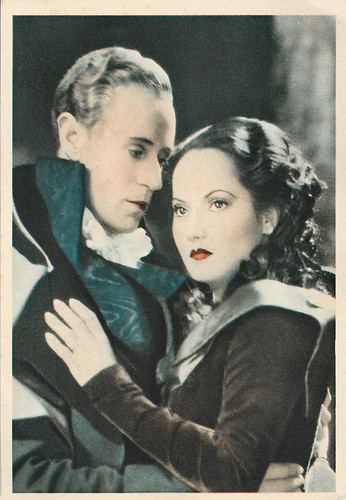
British postcard by De Reszke Cigarettes, no. 44. Photo: London Films. Leslie Howard and Merle Oberon in The Scarlet Pimpernel (Harold Young, 1934).
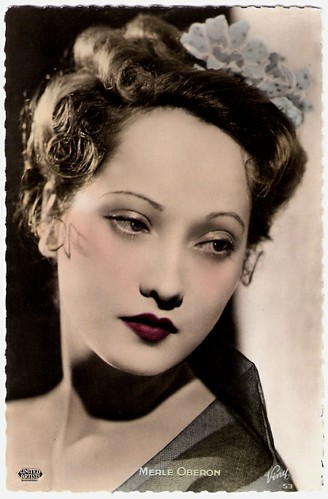
French postcard by Viny, no. 53. Photo: United Artists.
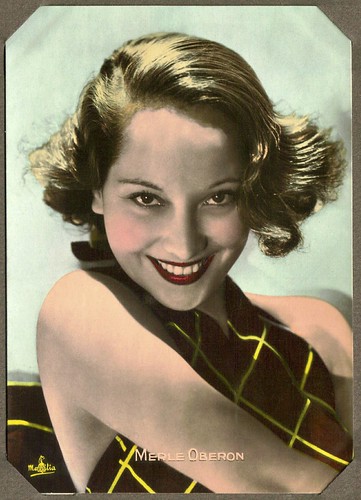
French card by Massilia. Collection: Amit Benyovits.

British postcard by Art Photo, no. 54.
Queenie
From the early days of her career, Merle Oberon succeeded in establishing a fabricated history of her origins in which she said that she had been born in Tasmania, Australia. According to her birth certificate though, Oberon was born in Bombay, British India in 1911 as Estelle Merle Thompson.
Merle was given ´Queenie´ as a nickname, in honour of Queen Mary who visited India along with King George V in 1911. Her parentage has remained deliberately obscure over the years. Some sources claim Charlotte Selby, a Eurasian from Ceylon with partial Māori heritage, and Arthur Terrence O'Brien Thompson, a British mechanical engineer from Darlington, who worked in Indian Railways, as Merle's parents.
At the age of fourteen years, Charlotte had given birth to her first child Constance, in Ceylon, from a relationship with Henry Alfred Selby, an Irish foreman of a tea planter. Some sources claim that Constance was the biological mother of Merle, even though Charlotte raised Merle as her own child. Merle believed the truth about her parentage would have destroyed her career prospects due to societal expectations and restrictions at that time. In 1914, Arthur Thompson joined the British Army and later died of pneumonia on the Western Front during the Battle of the Somme. Merle, with her mother (or grandmother), led an impoverished existence in shabby Bombay flats for a few years.
Then, in 1917, they moved to better circumstances in Calcutta. Oberon received a foundation scholarship to attend La Martiniere Calcutta for Girls, a well-known Calcutta private school. There, she was constantly taunted for her unconventional parentage and eventually quit school and had her lessons at home. Oberon first performed with the Calcutta Amateur Dramatic Society. She was also completely enamoured of the cinema and enjoyed going out to nightclubs. As she entered her teen years, she dated increasingly older, urbane men.
In 1928, she dated a former actor named Colonel Ben Finney. He promised to introduce her to Rex Ingram of Victorine Studios if she could come to France. Oberon jumped at the offer and decided to follow the man to the studios in France. There, Oberon and her mother found that their supposed benefactor had dodged them, but he had left a good word for her with Rex Ingram who liked Oberon's exotic appearance. He hired her as an extra in a party scene in The Three Passions (Rex Ingram, 1928) starring Alice Terry and Iván Petrovich.
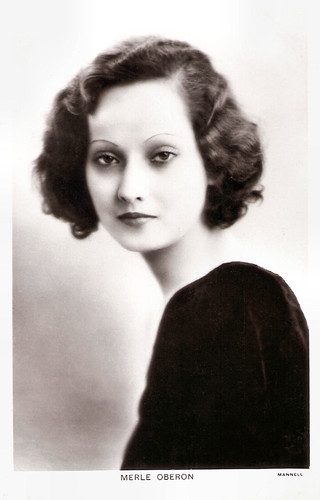
British postcard in the Picturegoer series. Photo by London-based British studio photographer George Mannell.
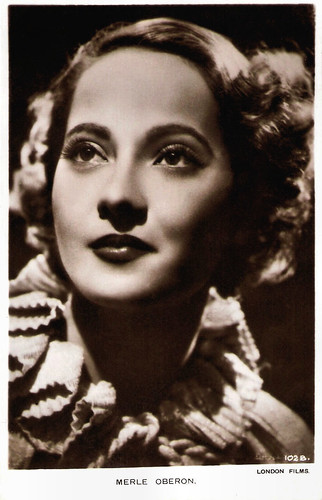
British 'Real Photograph' postcard, no. 102B. Photo: London Films.
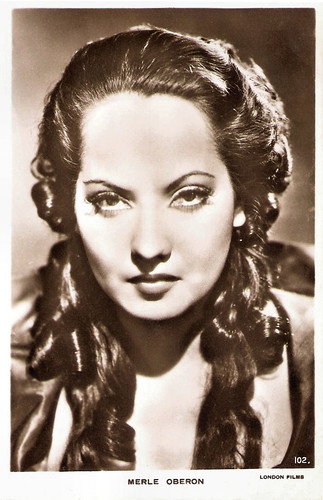
British postcard by Real Photograph, London, no. 102. Photo: London Films.

British Real Photograph postcard. Photo: London Film Production. Merle Oberon in The Private Life of Henry VIII (Alexander Korda, 1933).

British postcard in the Filmshots series by Film Weekly. Photo: London Films. Merle Oberon in The Private Life of Henry VIII (Alexander Korda, 1933).
Merle Oberon moved to England in 1928. Initially, she worked as a club hostess under the name Queenie O'Brien and played as an extra in various films. Finally, she landed a part with substance: the role of Ysobel d'Aunay in Men of Tomorrow (Zoltan Korda, Leontine Sagan, 1933) with Robert Donat.
She combined a slightly frosty reserve and a distinctive British accent with a somewhat exotic beauty which suggested a passionate nature. Her career went on to greater heights, thanks to director-producer Alexander Korda, who persuaded her to take the name under which she became famous.
Korda gave her a small but prominent role, under the name Merle Oberon, as Anne Boleyn in The Private Life of Henry VIII (1933) opposite Charles Laughton.
The film became a major success and Korda gave her leading roles, such as the temperamental dancer Antonita in The Private Life of Don Juan (Alexander Korda, 1934) opposite Douglas Fairbanks Sr., and Lady Blakeney in The Scarlet Pimpernel (Harold Young, 1934) with Leslie Howard, who became her lover for a while.
Oberon went to great lengths to disguise her mixed-race background and when her dark-skinned mother moved in with her, she masqueraded as Oberon's maid.
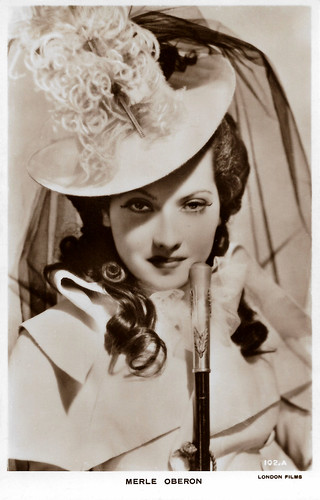
British Real Photograph postcard, no. 102a. Photo: London Film. Merle Oberon in The Scarlet Pimpernel (Alexander Korda, 1934).
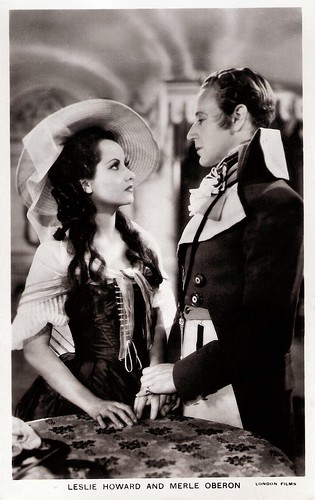
British postcard in the Film Partners Series, London, no. P 150. Photo: London Films. Leslie Howard and Merle Oberon in The Scarlet Pimpernel (Harold Young, 1934).

Dutch postcard. Photo: Loet C. Barnstijn / United Artists. Douglas Fairbanks and Merle Oberon in The Private Life of Don Juan (Alexander Korda, 1934), based on the play 'L'Homme de la rose' by Henry Bataille.

British postcard in the Film-Kurier series, no. 43. Photo: London Film Production.
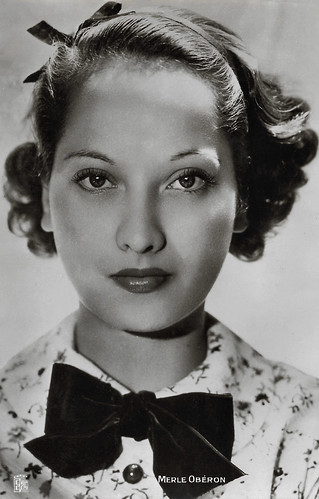
French postcard by Editions et Publications cinématographiques (EPC).
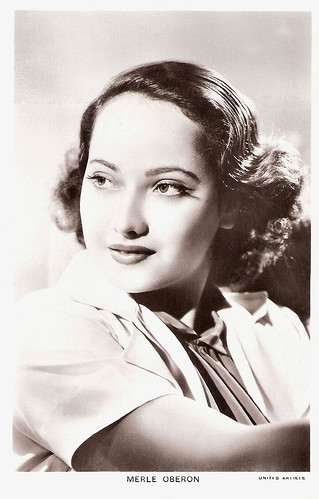
British postcard by Real Photograph, London, in the Picturegoer series, no. 820c. Photo: United Artists.
Alexander Korda sold 'shares' of Merle Oberon´s contract to producer Samuel Goldwyn, who gave her good vehicles in Hollywood. Her 'mother' stayed behind in England. Oberon received her only Oscar nomination as Best Actress for The Dark Angel (Sidney Franklin, 1935) opposite Fredric March.
Her work in that film resulted in offers for more quality pictures, and she appeared in several well-received films, such as These Three (William Wyler, 1936), a worthy but altered adaptation of Lillian Hellman's The Children's Hour in which a scandalous lesbian romance was rewritten as a heterosexual triangle.
Next she appeared in Over the Moon (Thornton Freeland, 1936) with Rex Harrison, and The Divorce of Lady X (Tim Whelan, 1938).
She was selected to star in Korda's epic film I, Claudius (Josef von Sternberg, 1937) as Messalina, but unfortunately, the film was abandoned in mid-production after Oberon was seriously injured in a 1937 car crash. Oberon was scarred for life, but skilled lighting technicians were able to hide her injuries from cinema audiences.
She went on to appear as Cathy in Wuthering Heights (William Wyler, 1939) opposite Laurence Olivier as Heathcliff. It would become her best-remembered performance.
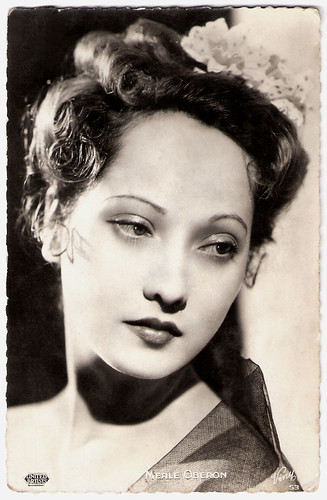
French postcard by Viny, no. 53. Photo: United Artists.
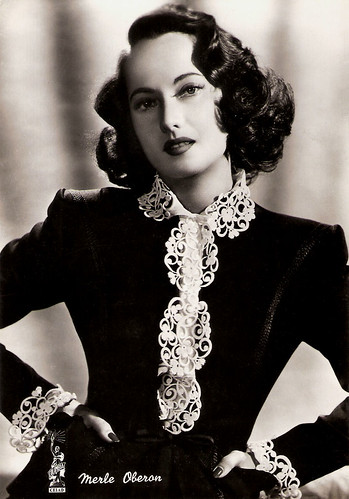
Italian postcard by Rotalfoto, Milano, no. 46. Photo: Columbia / CEIAD.

Spanish card, no. 1074. Merle Oberon and Laurence Olivier in The Divorce of Lady X (Tim Whelan, 1938).
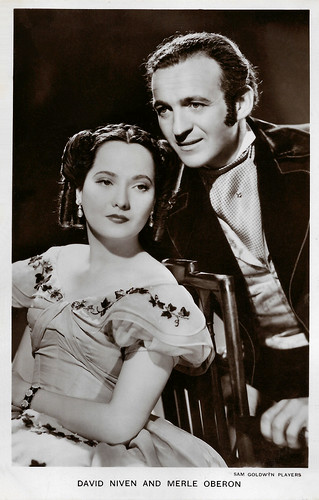
British postcard in the Film Partners Series, London, no. P 285. Photo: Sam Goldwyn. Merle Oberon and David Niven in Wuthering Heights (William Wyler, 1939).

Spanish postcard by Proa, no. 519. Photo: Merle Oberon as George Sand and Cornel Wilde as Frédéric Chopin in A Song to Remember (Charles Vidor, 1945). Sent by mail in 1950.
The 1940s proved to be a very busy decade for Merle Oberon, as she appeared in no less than 15 films, including That Uncertain Feeling (Ernst Lubitsch, 1941), The Lodger (John Brahm, 1944) about Jack the Ripper, and A Song to Remember (Charles Vidor, 1945) as the tempestuous and unconventional author George Sand.
Oberon became Lady Korda upon her husband's knighthood in 1942. She divorced him in 1945, to marry cinematographer Lucien Ballard. Ballard devised a special camera light for her to eliminate her facial scars on film. The light became known as the Obie.
After her role in Berlin Express (Jacques Tourneur, 1948), she would not be seen on the screen again until four years later, as Elizabeth Rockwell in Pardon My French (Bernard Vorhaus, 1951). She then appeared as Empress Josephine in Désirée (Henry Koster, 1954) with Marlon Brando and Jean Simmons. Unfortunately, she began appearing in fewer and fewer films over the ensuing years. After her divorce from Ballard in 1949, she married Italian-born industrialist Bruno Pagliai (from 1957 to 1973). They adopted two children, Francesca Pagliai and Bruno Pagliai Jr.
Her final film was Interval (Daniel Mann, 1973) which she also produced, and co-edited. According to Bruce Eder of AllMovie, it is “a strange romantic drama that costarred Dutch actor Robert Wolders, that failed to find good reviews or an audience”. After that, she retired and lived in Malibu, California. In 1975 she married Robert Wolders who would later become Audrey Hepburn's and Leslie Caron's companion.
In 1979 she died in Malibu after suffering a stroke at the age of 68. She left most of her money to be divided between her children. She left $1 million to the Motion Picture Country Home and Hospital. Her husband, Robert Wolders, got nothing, at his own request. Merle Oberon has a star on the Hollywood Walk of Fame for her contributions to Motion Pictures. Her strange and affecting true life story was the subject of Michael (nephew of Alexander) Korda's best-seller, Queenie (1985). This book was made into a TV miniseries, Queenie (1987) starring Mia Sara.

French postcard, no. 292. Photo: Universal International.
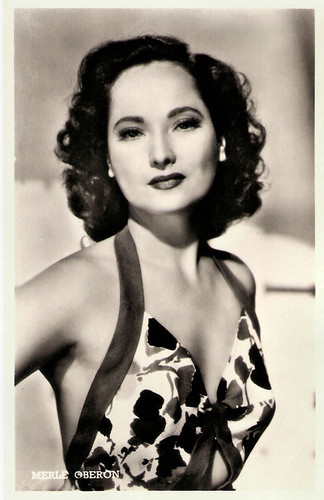
Dutch postcard by J.S.A. Photo: Universal M.P.E.
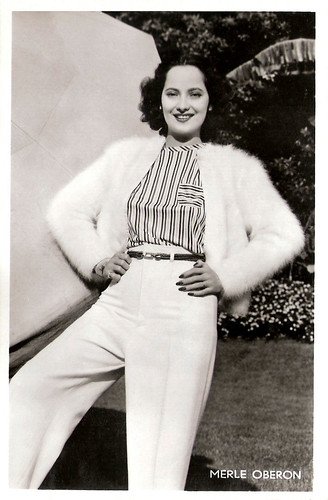
Dutch postcard.

Dutch postcard by J.S.A. Photo: Universal M.P.E.
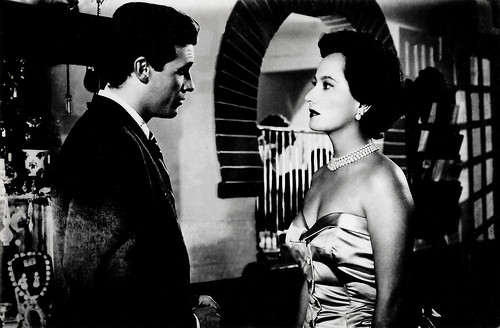
Spanish postcard. Francisco Rabal and Merle Oberon in Todo es posible en Granada/All is possible in Granada (José Luis Sáenz de Heredia, 1954).
Sources: Brian McFarlane (Encyclopedia of British Film), Denny Jackson (IMDb), Bruce Eder (AllMovie), Turner Classic Movies, Wikipedia and IMDb.

British postcard by Real Photograph, London, no. 102. Photo: London Films.

British Real Photograph postcard. Photo: London Film Production. Merle Oberon in The Private Life of Henry VIII (Alexander Korda, 1933).

British postcard in the Filmshots series by Film Weekly. Photo: London Films. Merle Oberon in The Private Life of Henry VIII (Alexander Korda, 1933).
Anne Boleyn
Merle Oberon moved to England in 1928. Initially, she worked as a club hostess under the name Queenie O'Brien and played as an extra in various films. Finally, she landed a part with substance: the role of Ysobel d'Aunay in Men of Tomorrow (Zoltan Korda, Leontine Sagan, 1933) with Robert Donat.
She combined a slightly frosty reserve and a distinctive British accent with a somewhat exotic beauty which suggested a passionate nature. Her career went on to greater heights, thanks to director-producer Alexander Korda, who persuaded her to take the name under which she became famous.
Korda gave her a small but prominent role, under the name Merle Oberon, as Anne Boleyn in The Private Life of Henry VIII (1933) opposite Charles Laughton.
The film became a major success and Korda gave her leading roles, such as the temperamental dancer Antonita in The Private Life of Don Juan (Alexander Korda, 1934) opposite Douglas Fairbanks Sr., and Lady Blakeney in The Scarlet Pimpernel (Harold Young, 1934) with Leslie Howard, who became her lover for a while.
Oberon went to great lengths to disguise her mixed-race background and when her dark-skinned mother moved in with her, she masqueraded as Oberon's maid.

British Real Photograph postcard, no. 102a. Photo: London Film. Merle Oberon in The Scarlet Pimpernel (Alexander Korda, 1934).

British postcard in the Film Partners Series, London, no. P 150. Photo: London Films. Leslie Howard and Merle Oberon in The Scarlet Pimpernel (Harold Young, 1934).

Dutch postcard. Photo: Loet C. Barnstijn / United Artists. Douglas Fairbanks and Merle Oberon in The Private Life of Don Juan (Alexander Korda, 1934), based on the play 'L'Homme de la rose' by Henry Bataille.

British postcard in the Film-Kurier series, no. 43. Photo: London Film Production.

French postcard by Editions et Publications cinématographiques (EPC).

British postcard by Real Photograph, London, in the Picturegoer series, no. 820c. Photo: United Artists.
Cathy
Alexander Korda sold 'shares' of Merle Oberon´s contract to producer Samuel Goldwyn, who gave her good vehicles in Hollywood. Her 'mother' stayed behind in England. Oberon received her only Oscar nomination as Best Actress for The Dark Angel (Sidney Franklin, 1935) opposite Fredric March.
Her work in that film resulted in offers for more quality pictures, and she appeared in several well-received films, such as These Three (William Wyler, 1936), a worthy but altered adaptation of Lillian Hellman's The Children's Hour in which a scandalous lesbian romance was rewritten as a heterosexual triangle.
Next she appeared in Over the Moon (Thornton Freeland, 1936) with Rex Harrison, and The Divorce of Lady X (Tim Whelan, 1938).
She was selected to star in Korda's epic film I, Claudius (Josef von Sternberg, 1937) as Messalina, but unfortunately, the film was abandoned in mid-production after Oberon was seriously injured in a 1937 car crash. Oberon was scarred for life, but skilled lighting technicians were able to hide her injuries from cinema audiences.
She went on to appear as Cathy in Wuthering Heights (William Wyler, 1939) opposite Laurence Olivier as Heathcliff. It would become her best-remembered performance.

French postcard by Viny, no. 53. Photo: United Artists.

Italian postcard by Rotalfoto, Milano, no. 46. Photo: Columbia / CEIAD.

Spanish card, no. 1074. Merle Oberon and Laurence Olivier in The Divorce of Lady X (Tim Whelan, 1938).

British postcard in the Film Partners Series, London, no. P 285. Photo: Sam Goldwyn. Merle Oberon and David Niven in Wuthering Heights (William Wyler, 1939).

Spanish postcard by Proa, no. 519. Photo: Merle Oberon as George Sand and Cornel Wilde as Frédéric Chopin in A Song to Remember (Charles Vidor, 1945). Sent by mail in 1950.
George Sand
The 1940s proved to be a very busy decade for Merle Oberon, as she appeared in no less than 15 films, including That Uncertain Feeling (Ernst Lubitsch, 1941), The Lodger (John Brahm, 1944) about Jack the Ripper, and A Song to Remember (Charles Vidor, 1945) as the tempestuous and unconventional author George Sand.
Oberon became Lady Korda upon her husband's knighthood in 1942. She divorced him in 1945, to marry cinematographer Lucien Ballard. Ballard devised a special camera light for her to eliminate her facial scars on film. The light became known as the Obie.
After her role in Berlin Express (Jacques Tourneur, 1948), she would not be seen on the screen again until four years later, as Elizabeth Rockwell in Pardon My French (Bernard Vorhaus, 1951). She then appeared as Empress Josephine in Désirée (Henry Koster, 1954) with Marlon Brando and Jean Simmons. Unfortunately, she began appearing in fewer and fewer films over the ensuing years. After her divorce from Ballard in 1949, she married Italian-born industrialist Bruno Pagliai (from 1957 to 1973). They adopted two children, Francesca Pagliai and Bruno Pagliai Jr.
Her final film was Interval (Daniel Mann, 1973) which she also produced, and co-edited. According to Bruce Eder of AllMovie, it is “a strange romantic drama that costarred Dutch actor Robert Wolders, that failed to find good reviews or an audience”. After that, she retired and lived in Malibu, California. In 1975 she married Robert Wolders who would later become Audrey Hepburn's and Leslie Caron's companion.
In 1979 she died in Malibu after suffering a stroke at the age of 68. She left most of her money to be divided between her children. She left $1 million to the Motion Picture Country Home and Hospital. Her husband, Robert Wolders, got nothing, at his own request. Merle Oberon has a star on the Hollywood Walk of Fame for her contributions to Motion Pictures. Her strange and affecting true life story was the subject of Michael (nephew of Alexander) Korda's best-seller, Queenie (1985). This book was made into a TV miniseries, Queenie (1987) starring Mia Sara.

French postcard, no. 292. Photo: Universal International.

Dutch postcard by J.S.A. Photo: Universal M.P.E.

Dutch postcard.

Dutch postcard by J.S.A. Photo: Universal M.P.E.

Spanish postcard. Francisco Rabal and Merle Oberon in Todo es posible en Granada/All is possible in Granada (José Luis Sáenz de Heredia, 1954).
Sources: Brian McFarlane (Encyclopedia of British Film), Denny Jackson (IMDb), Bruce Eder (AllMovie), Turner Classic Movies, Wikipedia and IMDb.
Fascinating woman. Just read a funny memoir by George Hamilton in which he joked that India was not to be mentioned in her presence!
ReplyDeleteQuite revealing about the attitudes of the time that she felt her origins must remain hidden.
ReplyDelete